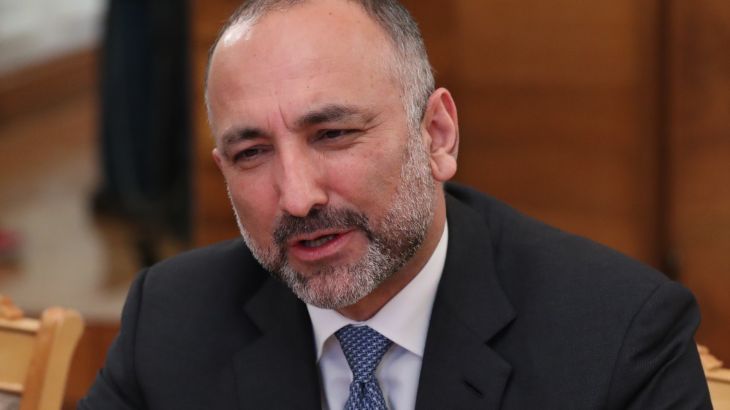Insistence on violence will marginalise perpetrators: Afghan FM
Afghan acting Foreign Minister Mohammed Haneef Atmar expresses optimism about overcoming obstacles in Taliban talks.

Doha, Qatar – Historic talks between the Afghan government and the Taliban in the Qatari capital might have stalled for days, but Mohammed Haneef Atmar, Afghanistan’s acting foreign minister, remains optimistic about their outcome.
“The reality now is that we have face-to-face direct negotiation, which shows welcome progress; yes, we have obstacles and that’s why we have this dialogue, to remove them,” Atmar told Al Jazeera on Monday.
Keep reading
list of 4 itemsPhotos: Tourist numbers up in post-war Afghanistan
Taliban ban on girls’ education defies both worldly and religious logic
Afghanistan calls for ‘respect’ after Cricket Australia snub
He was part of a high-level delegation led by Afghan President Ashraf Ghani that arrived in Doha on Sunday. During his two-day trip, Ghani and his team met the government negotiators, as well as diplomats from the United States – but did not interact with the Taliban.
Almost a month ago, Afghan government and Taliban leaders met in person for the first time after nearly 20 years of violence. The intra-Afghan peace talks are aimed at ending Afghanistan’s long-running war that has killed tens of thousands of people.
“We have engaged into a new chapter of diplomacy with our regional and international partners so obstacles can be resolved. Nobody expected these negotiations will be easy, everyone predicted a variety of hurdles,” said Atmar, adding that “our team has presented a number of counter-proposals [to the Taliban] to find common ground.”
But he also warned: “Those who insist on violence would be extremely marginalised and will not have any legitimacy in their causes.”
Atmar also said the government was expecting a reduction in violence, as promised at the beginning of the talks. “We are waiting for the implementation of that pledge,” he said.
Meanwhile, Taliban sources told Al Jazeera that no meeting has been scheduled between any of their leaders and Ghani.
The Taliban insists that the intra-Afghan talks should be seen as a continuation of the Doha Agreement signed between the group and the US in February.
The Afghan government was not a party to that agreement, and it has suggested some alternatives such as including recommendations by the Loya Jirga, a traditional Afghan council of tribal elders. The two sides remain divided over the issue.
In his meeting with the Afghan negotiators, Ghani said no one should interfere in the talks, while the involvement of a mediator to move the stalled process forward was not discussed.
‘Not prisoners of the past’
The negotiations in Doha are Afghan-owned and Afghan-led, and apart from the behind-closed-doors nudging and pushing, all regional and international parties to the conflict have so far been hands-off.
“It depends on whether you have a glass-half-full or half-empty view,” a Western diplomat told Al Jazeera. “At least no one has left the table. It is promising that they are pouring over each word and each sentence, which shows commitment. And if you’re an optimist, you can see that these issues have to be tackled at some point, so why not right at the onset?”
Later, an upbeat Ghani told a Doha auditorium full of diplomats and academics that he was hopeful this time around.
“Our conflict is not a civil war, it’s a regional conflict,” the president said. “My plea to the Taliban is do not be afraid of a ceasefire. A few million dollars can keep the war going but you are depriving the country of trillions of dollars.”
Calling Afghanistan “the Saudi Arabia of lithium”, Ghani added: “Our geology, geography and ecology has enormous potential and we have been traders for thousands of years.
“Afghans are not prisoners of their past and they deserve an end to killing each other,” the president said, before concluding that real peacemaking is not just signing agreements but being able to live together again.